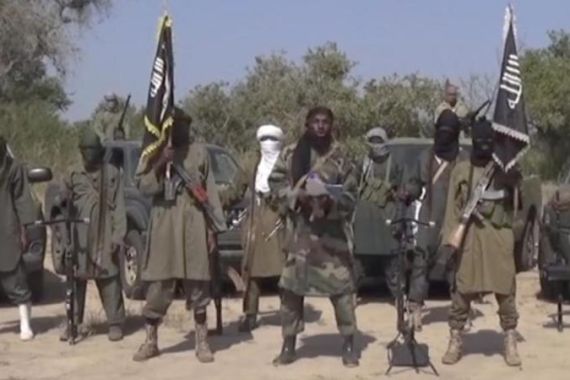Nigeria’s ‘fake’ ceasefire with Boko Haram
How were Nigerians led to believe that Boko Haram had agreed on a ceasefire?

Nigerians were ecstatic on October 17 when the federal government announced a ceasefire deal with Boko Haram. If it had been true, years of ruthless killing of several thousand citizens would have been halted – suddenly – and the over-200 Chibok girls kidnapped seven months ago would have been freed.
Sadly, Boko Haram held out for no longer than half-a-dozen hours before unleashing an attack on Abadam Village in Borno State, killing a resident. Very early the following day, eight people were mowed down in Dzur Village, also in Borno, consequently extinguishing whatever hopes anyone nursed of a ceasefire.
Keep reading
list of 4 itemsTen years after ‘Bring Back Our Girls,’ Nigeria’s kidnappings continue
Why mass kidnappings still plague Nigeria a decade after Chibok abductions
Children kidnapped in northern Nigeria have been freed
So, within a day of the ceasefire announcement, delirious Nigerians had become crestfallen and had started asking: “Was there really a ceasefire?”
It was not until another two weeks, though, that the leader of the group, Abubakar Shekau, dealt the coup de grace to a peace deal that had quickly gained international traction.
“We have not made ceasefire with anyone. What is our business with negotiation? We did not negotiate with anyone… It’s a lie; it’s a lie. We will not negotiate,” he said in a video released on October 31.
Who duped whom?
I feel little pity for President Goodluck Jonathan over the ceasefire debacle. For a whopping 18 days after Boko Haram struck in Chibok, Jonathan did not believe that an abduction of more than 200 girls indeed took place. He thought it was all a ruse – a propaganda by opponents of his re-election ambition.
And he neither saw the need to visit Chibok nor invite the grieving parents to Abuja. It took the pleading of a 17-year-old, Malala Yousafzai, for Jonathan to agree to meet with parents of the abducted girls “within 24 hours”.
|
|
| Inside Story – Nigeria deal with Boko Haram still possible? |
So if Jonathan’s peace-deal effort is now being misconstrued as a lie, well, it’s a taste of his own medicine. But in fairness to him, ceasefire negotiations were ongoing. Just with the wrong Boko Haram representatives.
In July and August, “Boko Haram commanders” wrote letters to the president of Chad, Idriss Deby Itno, himself a former rebel leader and well-decorated military officer, asking him to broker a ceasefire with Lagos.
It is a mystery what Alex Badeh, an air chief marshal and chief of defence staff, and Mike Omeri, coordinator of the National Information Centre (set up strictly to disseminate information relating to the insurgency) were thinking on October 17 when they gathered journalists together to tell them Boko Haram had announced a ceasefire.
“Already, the terrorists have announced a ceasefire in furtherance of their desire for peace,” Omeri said gleefully. “In this regard, the government of Nigeria has, in similar vein, declared a ceasefire.”
Exactly 10 days later, Aminu Wali, minister of foreign affairs, assured journalists that the ceasefire was intact.
“Boko Haram are saying that those ones [attacks] were done by other rogues and criminals,” he said after meeting with French Foreign Minister Laurent Fabius.
It was therefore shocking to hear Godswill Akpabio, governor of Akwa Ibom State and one of Jonathan’s staunchest allies, blame the media for the post-ceasefire confusion. Tragic. Uncharitable. To be sure, Akpabio was speaking for the government and for Sambo Dasuki, the president’s national security adviser (NSA).
“The NSA was of the opinion that high level contact with the Republic of Chad was made … and of course, no agreement has been reached yet. It is just that the press probably misunderstood what was reported. The discussions are ongoing,” he said.
According to journalist Ahmad Salkida, who has a close understanding of Boko Haram and its ideology, Danladi Ahmadu – the man who supposedly represented Boko Haram in the negotiations – would never have been chosen into the Shura (ruling council) of the terrorists because the name “Danladi” (meaning “born on a Sunday” – Christians’ holy day) is “filthy” to the sect’s Islamic orientations.
In short, it is clear that the government communicated with a powerless negotiator and most likely an impostor.
The announcement of what has turned out to be a phantom ceasefire is a gaffe Nigeria must learn from, especially the media and the military. The media must be discharging its reportorial responsibilities with stiffer scrutiny.
Clearly, it is not enough for the government to declare that “terrorists have announced a ceasefire”. Who announced it on behalf of the terrorists? Where was it announced? How, too? And what was proof that it was the decision of the Boko Haram hierarchy – not just a minority? Those were unanswered questions that should have been raised to temper the public optimism that followed the announcement.
With Nigeria’s main opposition party consistently haranguing and pillorying Jonathan for failing to halt Boko Haram, the president’s men were desperate to polish his image ahead of the 2015 poll. The faintest hint of a ceasefire would work magic; it had to be announced to the media at once – even if prematurely. Looking back, the media was duped, and so were the people, in turn.
Salkida warned early on that “the government is more interested in shadows and bubbles than in substance”. Few paid attention, it seems.
And so we are back to square one, having to deal with the disastrous strategy of the Nigerian military which has extended and broadened the conflict rather than curbed it.
Fisayo Soyombo edits Nigerian online newspaper TheCable.
